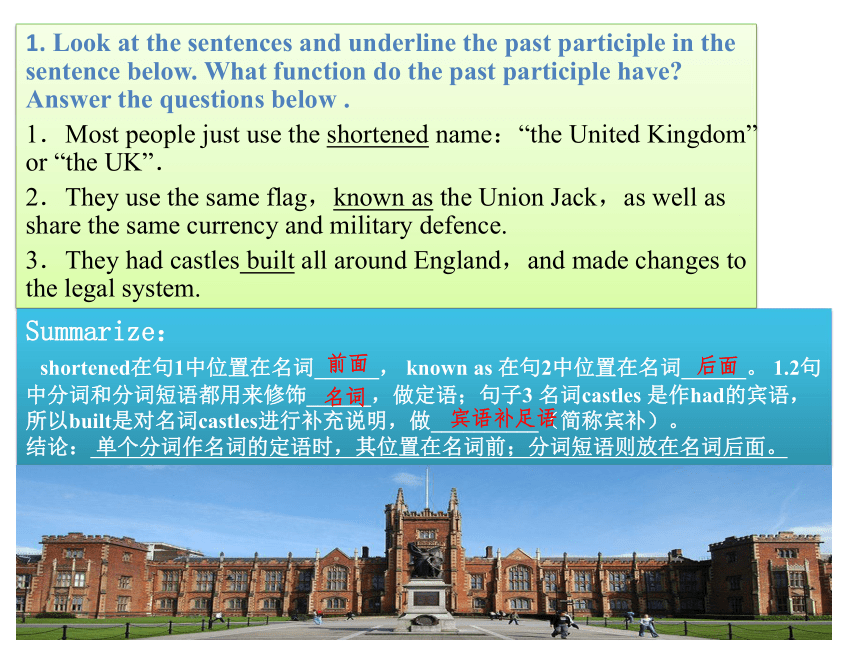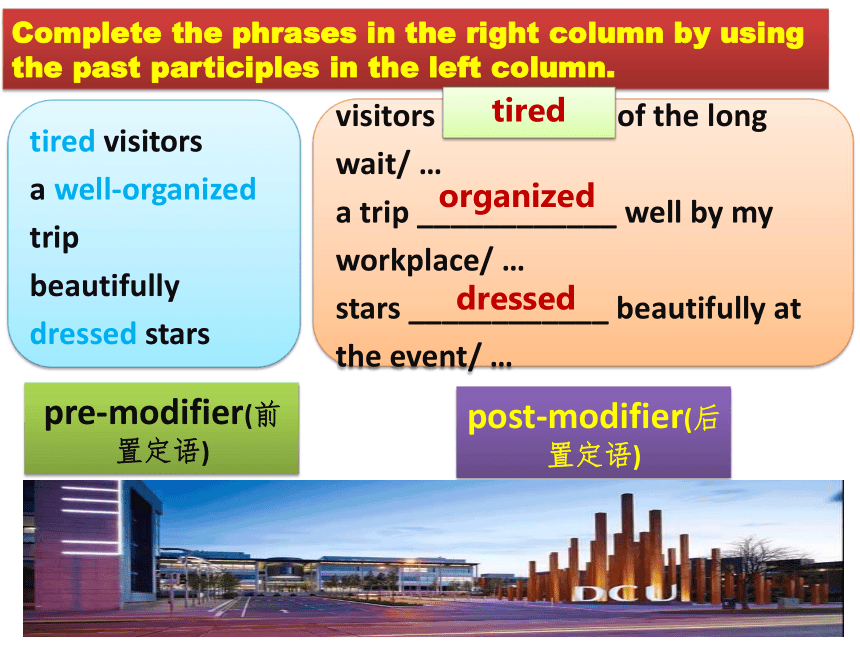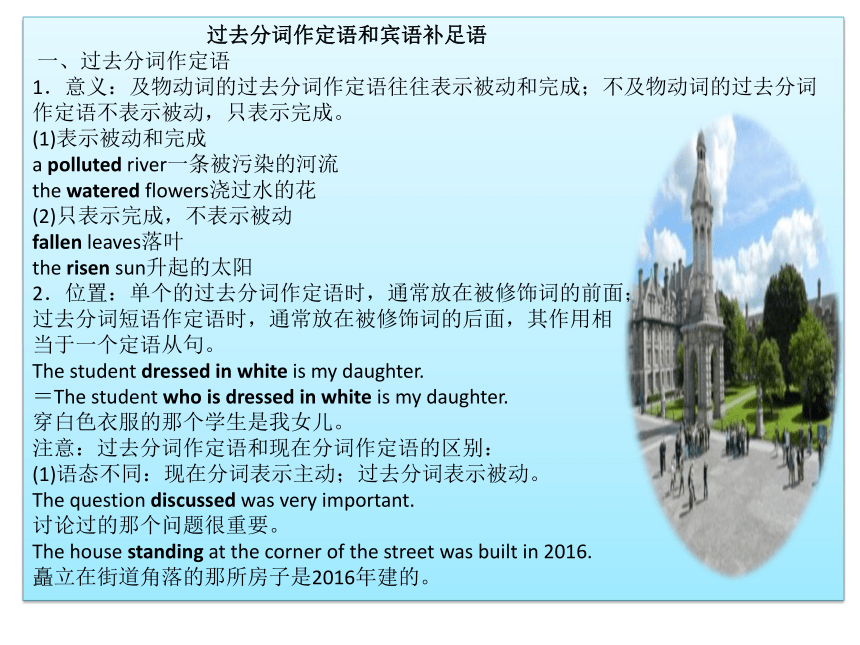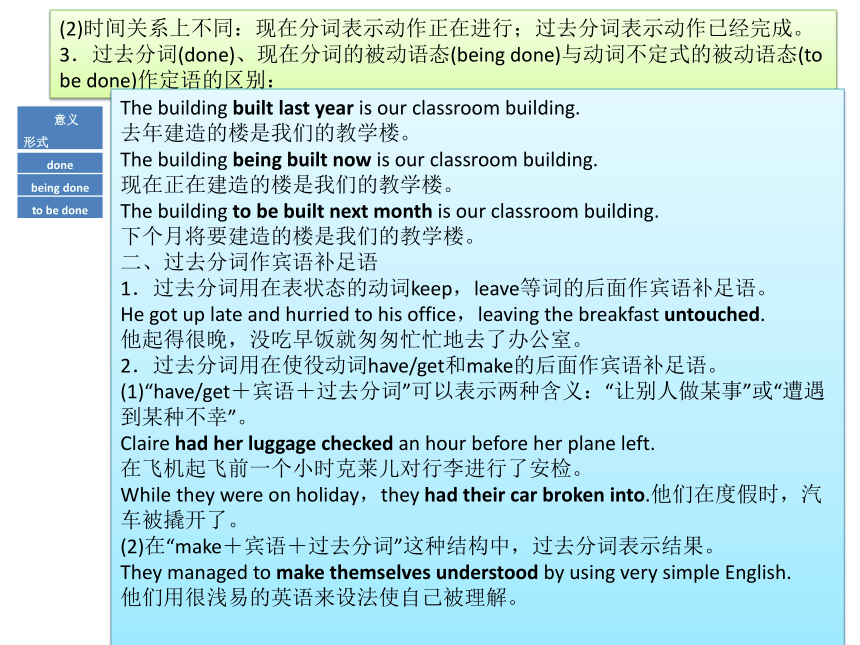2021-2022学年 Unit 4 History and Traditions Discoving Useful Structure课件(15张ppt)
文档属性
| 名称 | 2021-2022学年 Unit 4 History and Traditions Discoving Useful Structure课件(15张ppt) |  | |
| 格式 | zip | ||
| 文件大小 | 836.1KB | ||
| 资源类型 | 试卷 | ||
| 版本资源 | 人教版(2019) | ||
| 科目 | 英语 | ||
| 更新时间 | 2021-11-17 12:34:31 | ||
图片预览







文档简介
(共15张PPT)
Unit 4 History and Traditions
Part 3 Discovering useful structures
Learning Objectives
1. Learn to use the past participles as the attribute and the object complement.
2. Write a little story or describe situations by using the
past participles.
comparison
Most people just use the shortened name:” the United Kingdom” or “UK”
They use the same flag, which is known as the Union Jack.
They use the same flag, known as the Union Jack
They sent a lot of people to build castles all around England.
They had castles built all around England
Most people just use name which is shortened:” the United Kingdom” or “UK”
与前句相比,后句句式表达更简洁、
结构更加优化
1. Look at the sentences and underline the past participle in the sentence below. What function do the past participle have Answer the questions below .
1.Most people just use the shortened name:“the United Kingdom” or “the UK”.
2.They use the same flag,known as the Union Jack,as well as share the same currency and military defence.
3.They had castles built all around England,and made changes to the legal system.
Summarize:
shortened在句1中位置在名词______, known as 在句2中位置在名词______。 1.2句中分词和分词短语都用来修饰______,做定语;句子3 名词castles 是作had的宾语,所以built是对名词castles进行补充说明,做__________(简称宾补)。
结论: 单个分词作名词的定语时,其位置在名词前;分词短语则放在名词后面。
前面
后面
名词
宾语补足语
Complete the phrases in the right column by using
the past participles in the left column.
tired visitors
a well-organized trip
beautifully dressed stars
visitors __________ of the long wait/ …
a trip ____________ well by my workplace/ …
stars ____________ beautifully at the event/ …
tired
organized
dressed
pre-modifier(前置定语)
post-modifier(后置定语)
过去分词作定语和宾语补足语
一、过去分词作定语
1.意义:及物动词的过去分词作定语往往表示被动和完成;不及物动词的过去分词作定语不表示被动,只表示完成。
(1)表示被动和完成
a polluted river一条被污染的河流
the watered flowers浇过水的花
(2)只表示完成,不表示被动
fallen leaves落叶
the risen sun升起的太阳
2.位置:单个的过去分词作定语时,通常放在被修饰词的前面;
过去分词短语作定语时,通常放在被修饰词的后面,其作用相
当于一个定语从句。
The student dressed in white is my daughter.
=The student who is dressed in white is my daughter.
穿白色衣服的那个学生是我女儿。
注意:过去分词作定语和现在分词作定语的区别:
(1)语态不同:现在分词表示主动;过去分词表示被动。
The question discussed was very important.
讨论过的那个问题很重要。
The house standing at the corner of the street was built in 2016.
矗立在街道角落的那所房子是2016年建的。
(2)时间关系上不同:现在分词表示动作正在进行;过去分词表示动作已经完成。
3.过去分词(done)、现在分词的被动语态(being done)与动词不定式的被动语态(to be done)作定语的区别:
意义
形式
done
being done
to be done
The building built last year is our classroom building.
去年建造的楼是我们的教学楼。
The building being built now is our classroom building.
现在正在建造的楼是我们的教学楼。
The building to be built next month is our classroom building.
下个月将要建造的楼是我们的教学楼。
二、过去分词作宾语补足语
1.过去分词用在表状态的动词keep,leave等词的后面作宾语补足语。
He got up late and hurried to his office,leaving the breakfast untouched.
他起得很晚,没吃早饭就匆匆忙忙地去了办公室。
2.过去分词用在使役动词have/get和make的后面作宾语补足语。
(1)“have/get+宾语+过去分词”可以表示两种含义:“让别人做某事”或“遭遇到某种不幸”。
Claire had her luggage checked an hour before her plane left.
在飞机起飞前一个小时克莱儿对行李进行了安检。
While they were on holiday,they had their car broken into.他们在度假时,汽车被撬开了。
(2)在“make+宾语+过去分词”这种结构中,过去分词表示结果。
They managed to make themselves understood by using very simple English.
他们用很浅易的英语来设法使自己被理解。
4.表示“意愿;命令”的动词,如like,want,wish,expect,order等可用过去分词作宾语补足语。
The manager ordered the work finished at the end of this week.
经理要求在本周末完成这项工作。
5.过去分词用在“with+宾语+宾补”这一结构中,过去分词与宾语之间是动宾关系。
The living room is clean and tidy,with a dining table already laid for a meal to be cooked.
客厅既干净又整洁,已摆好了餐桌准备盛放待煮的饭菜。
John received an invitation to dinner,and with his work finished,he gladly accepted it.
约翰收到一份宴请函而且他的工作也做完了,他就欣然接受了邀请。
6.非谓语动词(短语)作宾语补足语的区别:
(1)感官动词(短语)see,watch,observe,look at,notice,hear,listen to,feel等的宾语补足语主要有三种形式,试比较(以hear为例):
hear+宾语+
I heard her singing an English song when I passed by her room yesterday.
昨天经过她房间时,我听她正在唱英文歌。(主动、正在进行)
I heard her sing an English song just now.
刚才我听见她唱了一首英文歌。(主动、完成)
To learn English well,we should find opportunities to hear English spoken as much as possible.
为了学好英语,我们应该尽可能多地听英语。(被动、无时间性)
(2)使役动词make,have,get,keep后加复合宾语的比较
make+宾语+宾语
make+宾语+…..
The shocking news made me realize what terrible problems we would face.
这个令人震惊的消息使我意识到我们将面临多么可怕的问题。
I made myself known to them first and then we talked about our hobbies.
我先向他们作了自我介绍,然后我们谈论了我们的爱好。
have+宾语+…..
Mother had me go to the shop and buy some salt.
妈妈让我去商店买些食盐。
He had us laughing all through the meal.
整顿饭下来他让我们笑个不停。
My elder sister had her wallet stolen on a bus last month.
上个月,我姐姐的钱包在公共汽车上被偷了。
get+宾语+……
He got me to post the letter for him.
他让我替他寄信。
The captain got the soldiers moving toward the front after a short rest.
休息了片刻之后,上尉让士兵们开始朝前线行进。
I’ll get my cellphone repaired tomorrow.
我明天要(请人)修一下我的手机。
keep+宾语+
I’m sorry to have kept you waiting so long.
对不起,让你久等了。
She kept her eyes shut and stayed where she was.
她紧闭双眼,待在原地未动。
(3)with复合结构中宾语补足语的比较
with+……
WeChat is like a public network,with people sharing information publicly;whatever they say or publish can be seen by everybody.
微信像是一个公开网络,人们公开分享信息,不管他们说什么、发布什么,大家都可以看到。
With a great weight taken off her mind,she passed all the tests successfully.
由于放下了极大的思想包袱,她成功地通过了所有考试。
Pay attention to
Past participle as the object complement
.have/get/make/keep/leave sb./sth. done
.hear/see/watch/notice sb./sth. done
.find sb./sth. done
Discuss in groups to summarize usage of past participle as the attribute and the object complement using the mindmap .
Discussion
V-ed在句中可作 _____、_____________。
定语
宾语补足语
①单个V-ed作定语;
② V-ed短语作定语通常后置,相当于定语从句;
③V-ed有时还可用作非限制性定语,相当于一个非限制性定语从句。
V-ed作宾语补足语通常用于:
①表示感观、感觉和发觉的动词。
②表示“致使”意义的动词。
③with的复合结构。
作定语
作宾补
Summary
Read the sentences and underline the –ed form as the object complement.
1 Judy and I had our car parked in an underground car park near Trafalgar Square, where we could get our car battery charged.
2 When we finally reached the service desk to ask for audio guides, we heard it announced that there were no audio guides left.
3 We found ourselves very surprised by the large number of visitors and the amount of noise at the entrance of the National Gallery.
4 Judy had her eyes fixed on Van Gogh’s Sunflowers. It was hard to approach the painting as there were so many people around.
5 She had a copy of the painting boxed to ensure that it was delivered safely.
4. Rewrite the sentences with past participles as the attribute, and then see whether you can write a little story withthem.
1. Loch Ness, surrounded by beautiful natural landscape, looks amazing.
2. Carl and his friends stayed with a generous family who offered them homemade bread with butter and honey.
3. The family's ancestors once attended to wounded soldiers in the First World War.
4. The young people attracted by the legend of Loch Ness watched over the lake with their cameras and binoculars positioned on the hill.
Thank you
Unit 4 History and Traditions
Part 3 Discovering useful structures
Learning Objectives
1. Learn to use the past participles as the attribute and the object complement.
2. Write a little story or describe situations by using the
past participles.
comparison
Most people just use the shortened name:” the United Kingdom” or “UK”
They use the same flag, which is known as the Union Jack.
They use the same flag, known as the Union Jack
They sent a lot of people to build castles all around England.
They had castles built all around England
Most people just use name which is shortened:” the United Kingdom” or “UK”
与前句相比,后句句式表达更简洁、
结构更加优化
1. Look at the sentences and underline the past participle in the sentence below. What function do the past participle have Answer the questions below .
1.Most people just use the shortened name:“the United Kingdom” or “the UK”.
2.They use the same flag,known as the Union Jack,as well as share the same currency and military defence.
3.They had castles built all around England,and made changes to the legal system.
Summarize:
shortened在句1中位置在名词______, known as 在句2中位置在名词______。 1.2句中分词和分词短语都用来修饰______,做定语;句子3 名词castles 是作had的宾语,所以built是对名词castles进行补充说明,做__________(简称宾补)。
结论: 单个分词作名词的定语时,其位置在名词前;分词短语则放在名词后面。
前面
后面
名词
宾语补足语
Complete the phrases in the right column by using
the past participles in the left column.
tired visitors
a well-organized trip
beautifully dressed stars
visitors __________ of the long wait/ …
a trip ____________ well by my workplace/ …
stars ____________ beautifully at the event/ …
tired
organized
dressed
pre-modifier(前置定语)
post-modifier(后置定语)
过去分词作定语和宾语补足语
一、过去分词作定语
1.意义:及物动词的过去分词作定语往往表示被动和完成;不及物动词的过去分词作定语不表示被动,只表示完成。
(1)表示被动和完成
a polluted river一条被污染的河流
the watered flowers浇过水的花
(2)只表示完成,不表示被动
fallen leaves落叶
the risen sun升起的太阳
2.位置:单个的过去分词作定语时,通常放在被修饰词的前面;
过去分词短语作定语时,通常放在被修饰词的后面,其作用相
当于一个定语从句。
The student dressed in white is my daughter.
=The student who is dressed in white is my daughter.
穿白色衣服的那个学生是我女儿。
注意:过去分词作定语和现在分词作定语的区别:
(1)语态不同:现在分词表示主动;过去分词表示被动。
The question discussed was very important.
讨论过的那个问题很重要。
The house standing at the corner of the street was built in 2016.
矗立在街道角落的那所房子是2016年建的。
(2)时间关系上不同:现在分词表示动作正在进行;过去分词表示动作已经完成。
3.过去分词(done)、现在分词的被动语态(being done)与动词不定式的被动语态(to be done)作定语的区别:
意义
形式
done
being done
to be done
The building built last year is our classroom building.
去年建造的楼是我们的教学楼。
The building being built now is our classroom building.
现在正在建造的楼是我们的教学楼。
The building to be built next month is our classroom building.
下个月将要建造的楼是我们的教学楼。
二、过去分词作宾语补足语
1.过去分词用在表状态的动词keep,leave等词的后面作宾语补足语。
He got up late and hurried to his office,leaving the breakfast untouched.
他起得很晚,没吃早饭就匆匆忙忙地去了办公室。
2.过去分词用在使役动词have/get和make的后面作宾语补足语。
(1)“have/get+宾语+过去分词”可以表示两种含义:“让别人做某事”或“遭遇到某种不幸”。
Claire had her luggage checked an hour before her plane left.
在飞机起飞前一个小时克莱儿对行李进行了安检。
While they were on holiday,they had their car broken into.他们在度假时,汽车被撬开了。
(2)在“make+宾语+过去分词”这种结构中,过去分词表示结果。
They managed to make themselves understood by using very simple English.
他们用很浅易的英语来设法使自己被理解。
4.表示“意愿;命令”的动词,如like,want,wish,expect,order等可用过去分词作宾语补足语。
The manager ordered the work finished at the end of this week.
经理要求在本周末完成这项工作。
5.过去分词用在“with+宾语+宾补”这一结构中,过去分词与宾语之间是动宾关系。
The living room is clean and tidy,with a dining table already laid for a meal to be cooked.
客厅既干净又整洁,已摆好了餐桌准备盛放待煮的饭菜。
John received an invitation to dinner,and with his work finished,he gladly accepted it.
约翰收到一份宴请函而且他的工作也做完了,他就欣然接受了邀请。
6.非谓语动词(短语)作宾语补足语的区别:
(1)感官动词(短语)see,watch,observe,look at,notice,hear,listen to,feel等的宾语补足语主要有三种形式,试比较(以hear为例):
hear+宾语+
I heard her singing an English song when I passed by her room yesterday.
昨天经过她房间时,我听她正在唱英文歌。(主动、正在进行)
I heard her sing an English song just now.
刚才我听见她唱了一首英文歌。(主动、完成)
To learn English well,we should find opportunities to hear English spoken as much as possible.
为了学好英语,我们应该尽可能多地听英语。(被动、无时间性)
(2)使役动词make,have,get,keep后加复合宾语的比较
make+宾语+宾语
make+宾语+…..
The shocking news made me realize what terrible problems we would face.
这个令人震惊的消息使我意识到我们将面临多么可怕的问题。
I made myself known to them first and then we talked about our hobbies.
我先向他们作了自我介绍,然后我们谈论了我们的爱好。
have+宾语+…..
Mother had me go to the shop and buy some salt.
妈妈让我去商店买些食盐。
He had us laughing all through the meal.
整顿饭下来他让我们笑个不停。
My elder sister had her wallet stolen on a bus last month.
上个月,我姐姐的钱包在公共汽车上被偷了。
get+宾语+……
He got me to post the letter for him.
他让我替他寄信。
The captain got the soldiers moving toward the front after a short rest.
休息了片刻之后,上尉让士兵们开始朝前线行进。
I’ll get my cellphone repaired tomorrow.
我明天要(请人)修一下我的手机。
keep+宾语+
I’m sorry to have kept you waiting so long.
对不起,让你久等了。
She kept her eyes shut and stayed where she was.
她紧闭双眼,待在原地未动。
(3)with复合结构中宾语补足语的比较
with+……
WeChat is like a public network,with people sharing information publicly;whatever they say or publish can be seen by everybody.
微信像是一个公开网络,人们公开分享信息,不管他们说什么、发布什么,大家都可以看到。
With a great weight taken off her mind,she passed all the tests successfully.
由于放下了极大的思想包袱,她成功地通过了所有考试。
Pay attention to
Past participle as the object complement
.have/get/make/keep/leave sb./sth. done
.hear/see/watch/notice sb./sth. done
.find sb./sth. done
Discuss in groups to summarize usage of past participle as the attribute and the object complement using the mindmap .
Discussion
V-ed在句中可作 _____、_____________。
定语
宾语补足语
①单个V-ed作定语;
② V-ed短语作定语通常后置,相当于定语从句;
③V-ed有时还可用作非限制性定语,相当于一个非限制性定语从句。
V-ed作宾语补足语通常用于:
①表示感观、感觉和发觉的动词。
②表示“致使”意义的动词。
③with的复合结构。
作定语
作宾补
Summary
Read the sentences and underline the –ed form as the object complement.
1 Judy and I had our car parked in an underground car park near Trafalgar Square, where we could get our car battery charged.
2 When we finally reached the service desk to ask for audio guides, we heard it announced that there were no audio guides left.
3 We found ourselves very surprised by the large number of visitors and the amount of noise at the entrance of the National Gallery.
4 Judy had her eyes fixed on Van Gogh’s Sunflowers. It was hard to approach the painting as there were so many people around.
5 She had a copy of the painting boxed to ensure that it was delivered safely.
4. Rewrite the sentences with past participles as the attribute, and then see whether you can write a little story withthem.
1. Loch Ness, surrounded by beautiful natural landscape, looks amazing.
2. Carl and his friends stayed with a generous family who offered them homemade bread with butter and honey.
3. The family's ancestors once attended to wounded soldiers in the First World War.
4. The young people attracted by the legend of Loch Ness watched over the lake with their cameras and binoculars positioned on the hill.
Thank you
